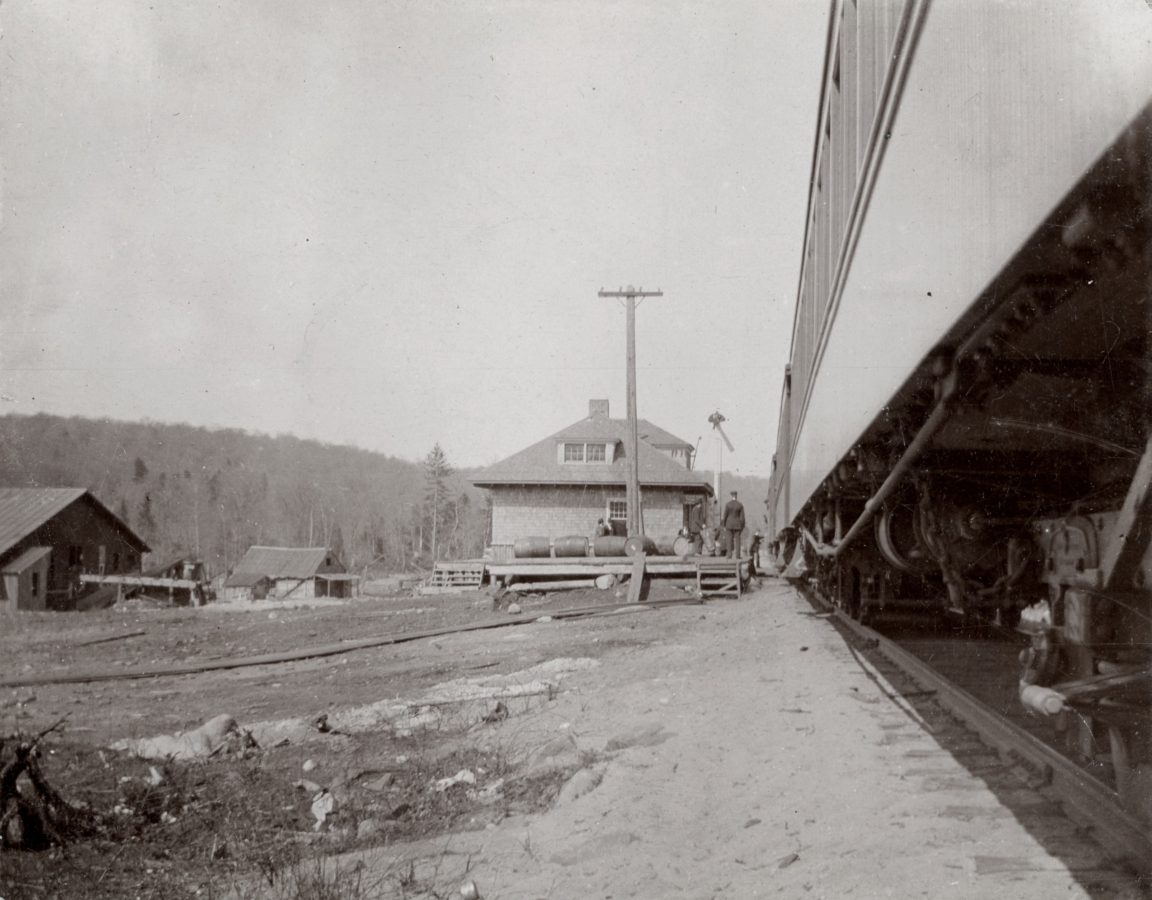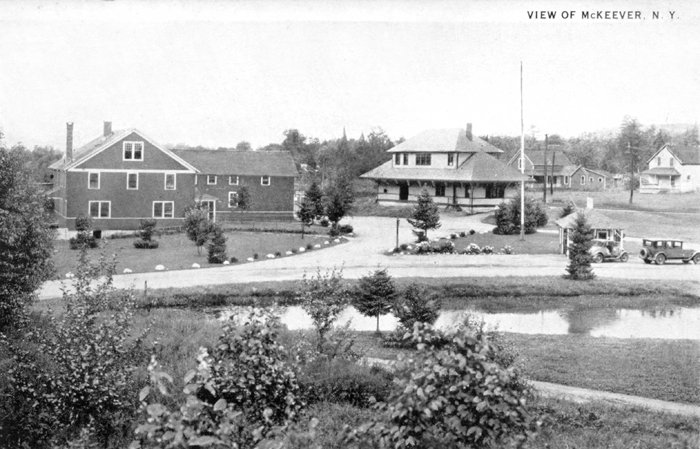What were the responsibilities of a station agent in a smaller community? Was he/she responsible for all aspects of running the station i.e. selling tickets, unloading of baggage cars, station maintenance etc? Just curious… station agents often lived in accommodations above the station, suggesting that the job involved alot more than 9 to 5 and was more of a lifestyle commitment.
I recall reading an account of a station agent in Omro, Wisconsin back in the 1800s. The station agent was provided living quarters by the railroad in the station, but at the same time was required to pay out of his wages any expenses incurred in the operation of the station. This included repairs to a short swing bridge over the Fox River, which was navigable at that time.
I purchased a book entitled “The Station Agent’s Blue Book, A Practical Reference Book for those Actively engaged in Station Work…” by O.B. Kirkpatrick. The 500+ page book outlines just about everything an agent could encounter. While there is no date of publication my guess is the '20s - 30’s.
Lots of accounting, tariff coverage, reports, and rules included. It appears that the station agent was the local face of the railroad in dealing with freight and passenger customers. Would have been an interesting job. Remember at that time there was quite a bit LCL business.
Ed
I would surmise (and often use as an example) that a live-in station agent was probably responsible for station operations 24/7. This would obviously apply to a station with relatively light traffic.
We have a station along the line that was originally built as a single story, with the second floor added later precisely as quarters for such an agent.
There was a large lumber complex there, no doubt requiring accounting for cars in and out as well as passengers, etc.
An example of the 24/7 thing would be a train that comes in at 3 in the morning, requiring the agent to be up and deal with it. He would otherwise adjust his personal time (including sleep) in accordance with the schedule. I would imagine that if there was enough business, a second agent would also work the station.
In the mid-20th Century - YES. The only exception is that the Agent generally lives in a house in his community. The Agent was also frequently involved in Railway Express Agency business and was frequently the Western Union Telegraph representative in town. In addition to handling the accounting functions for his station he would also converse with his customers their forthcoming car needs for loading. The car requirements would be forwarded to the Division Car Distributor at Division headquarters.
Depends upon location. Phoenix or Holbrook, AZ would have substantial differences.
As has been mentioned, both ‘when’ and ‘where’ make a difference. In the 1890s, everything and everyone coming into and out of a small town would be using the railroad, so having a ‘live in’ station master made sense. As time went on, and things like automobiles came along, the station master could live in a house and drive to work in the station. By the mid-20th century, with less business for the railroad, you might have one employee in charge of more than one station, working at one station in the morning and another in the afternoon, or perhaps on alternating days.
A neat example of a station agent’s quarters above the station:
 CN Station Historic Site circa. 1915 - Fort Langley by Peterson Ph♡tography, on Flickr
CN Station Historic Site circa. 1915 - Fort Langley by Peterson Ph♡tography, on Flickr
Here’s the McKeever, NY station on the Mohawk & Malone (soon to be NYC) as it was originally built:

Here it is in 1965, somewhat the worse for wear, from a Central NY NRHS excursion.

Here’s the station in the 1920’s. Of those in the image, it is the only building still standing:

And here’s a more current picture, from the “road” side of the station. It is in use as a seasonal residence. I’ve heard the daughter used to hate the trains going by northbound as there’s a crossing just past the station and the horn would blast into her window…
B&O Agent’s Office - Clay City, IL

Often the small towns grew up around the railroad, many were laid out by land companies associated with the railroad. There wouldn’t be much in the way for permanent lodging for an agent with a family. The depots with living quarters were out of a necessity of the time.
At a one man station, the agent did it all. Clerical, telegraphy, janitorial, and light maintenance. In the early days, maintenance may have included servicing the lanterns for switch stands and the train order signal, if equipped. Before the 8 hour day became the standard, office hours could be as long as 12 hours a day. Especially on main lines. Even when the office was closed the agent may be needed by the dispatcher for train orders. A call bell would probably be placed in the living quarters to summon the agent.
This drawing, I believe done back in the 1930s, kind of sums up the agent’s world. Of course it’s a caricature, but beyond the railroad and Western Union duties, the agent in more remote areas may have been involved in the governance of the community he lived in. https://www.flickr.com/photos/wb5kcm/1457506573
Jeff
I’ve read that due to the workload and 24/7 hour availability requirement that a station agent sometimes employed his/her own family members i.e. spouse and kids worked some shifts and performed some tasks when the agent him/herself was unavailable or taking time off. Probably the agent compensated family members directly.
Who would the station agent report to… the division superintendant?
The Division Supt. would normally be in charge of all things ‘operational’. There would be a different organizational structure for the various BUSINESS aspects of the company. I don’t have any org charts going back to 19th Century or early 20th Century. I do have a public timetable for the B&O from 1948 showing in part its Traffic Department with the Vice President of Traffic at its summit.

Years ago it wasn’t unusual for a teenaged boy to do odd jobs and chores, like sweeping up, etc in exchange to learn telegraphy and a little clerical work. Once of age and reasonable competence, they could get a job with the railroad.
I’ve heard of children of the agent also being taught such things and leading to jobs with the railroad.
Jeff
TSG Multimedia recently posted an interesting video about an SP station in California, and what life was like for the station agent and family:
https://www.youtube.com/watch?v=xM7kCcB9vGs
It notes one station agent moved 17 times, which was part of the reason so many small town stations included living facilities.
There are a number of good first person accounts of working as a station agent.
Burlington Route Depot Life - Hadcock
Depot Days - Stimson
Prairie Stationmaster - Clayburn
Ten Turtles to Tucumcari - Garrett
Woman Operator on the Milwaukee Railroad During World War II - Byington
Young employee, those with little seniority, will always have to react when senior employees have their jobs eliminated and/or their job responsiblities substantially changed which entitles them to ‘exercise their seniority’ to any job that is held by someone with less seniority. The reality of the situations are that ‘young’ employees get bumped, repeatedly. In the times before the 1960’s the Extra List for Agent/Operators were not guaranteed - no work, no pay.
While the docent mentioned teletype being installed at that particular agency, during my ‘early’ years on the B&O teletypes were primarily installed at yard offices and Division offices, rarely to never at Agencies.
In my own career it took four years before I accumulated enough seniority to be able to hold a regualr job I DESIRED to work. If jobs went NO BID for two cycles, then the youngest person on the Extra List would be assigned to the vacancy. During that period on the Extra List on three divisions I worked at 36 different job locations.
I knew 3 RI agents and 1 MILW agent. Of them, the MILW agent lived in the town he was agent. When the MILW cutback in 1980, the agency was not on the retained trackage. He then commuted about 100 miles (one way) until he retired.
Of the RI agents, two commuted, the other rented a house in the town he worked at. They didn’t drive every day. But rented a room and went home on the weekends. I think the MILW agent did the same.
By the late 70s when I met these men, agencies were being cut. These men had established homes where they had been able to hold for years, until the job abolishments caught up with them.
One of the RI men, whom I kept in touch with until he passed away, had a brother who went into engine service with the RI in Chicago. He told me he became a clerk so he could be home more, not moving around so much. His father had been a RI engineer. He said it turned out that his brother, even being an engineer, was home more often while he was bounced around a large chunk of Iowa working various clerical jobs. Even after he had what was considered good seniority.
Jeff
Milwaukee Roads Brookfield, WI station had a station agent at least until 1971 or 1972. Not sure where he lived but it was not at the depot. He would unlock the stations waiting room and sell passenger tickets on the local Cannonball run. He also managed the freight clients in the Town of Brookfield as well as the Waukesha branch. He used the depot as an office. I remember seeing him when I was a kid and then he disappeared replaced by the occasional section crew visit as they later used the depot to store section cars and other railroad equipment. They would part a black car with Milwaukee road emblem on the doors and take off in a section car…returning later in the afternoon. The depot remained locked for the most part after the 1977-78 bankruptcy and my guess is whomever used it before was let go or consolidated to Milwaukee. They still stored section cars there until the mid-1980s I believe.
The last time I was at Chanute AFB, IL, late '74, early '74, there was still an agent at the Rantoul station. Never really got to know him, but I think he recognized me. I really didn’t have the knowledge or the wherewithal to ask many questions.
ICG at that time was two track, current of traffic. Saw him hoop up orders (or hang them on the crane) quite a few times if a train was going to have to cross over to the “wrong” main.